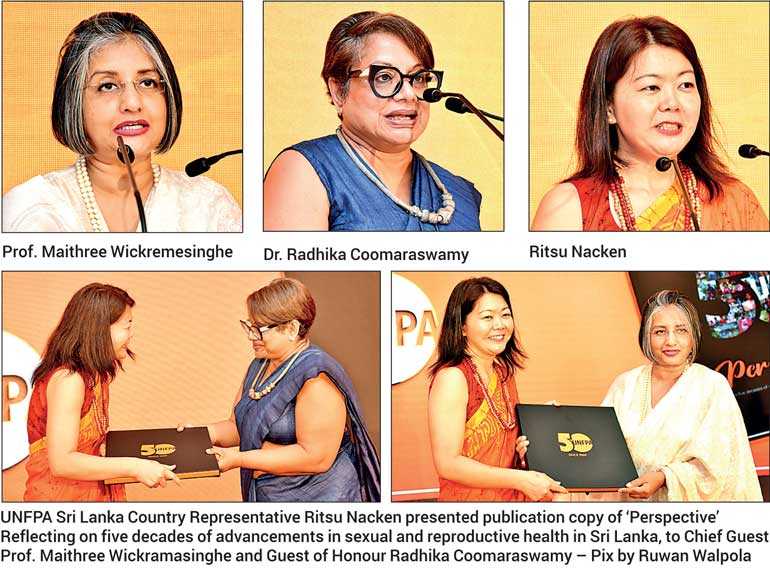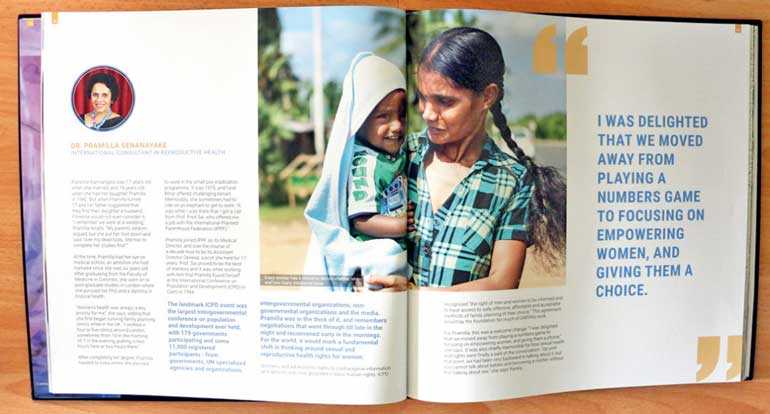Friday Feb 27, 2026
Friday Feb 27, 2026
Thursday, 18 July 2019 00:56 - - {{hitsCtrl.values.hits}}


Perspectives
“I had always wanted to become a mother, but this moment was a critical moment for me professionally, so we decided to wait a year before we had a child,” says Razni (30). In 1994, the landmark International Conference on Population and Development (ICPD) in Cairo, recognised that reproductive health and women’s empowerment are intertwined, and both are necessary for development. 25 years on, unlike Razni, many women and girls in Sri Lanka and around the world, still lack the autonomy to make safe and informed decisions about whether to have children, and if so, when and how many children to have.
This year marks two important milestones in the field of reproductive health: 50 years since the United Nations Population Fund (UNFPA) began operations globally, and 25 years since the International Conference on Population and Development (ICPD). Commemorating these milestones, in light of World Population Day, UNFPA launched the publication ‘Perspectives’, a reflection on five decades of advancements in sexual and reproductive health and rights in Sri Lanka.
The publication features stories like Razni’s who have benefitted from these advancements, as well as from champions in Sri Lanka, such as Bradman Weerakoon, who have driven positive change over the years. It further highlights how an individual’s reproductive rights and choices have always been at the heart of the population and development agenda in the country.
Launching the publication at an event attended by ministers, parliamentarians, officials from the diplomatic community, civil society representatives, UN agencies, and activists, UNFPA Representative in Sri Lanka Ritsu Nacken noted, “While much progress has been made globally, women’s rights, particularly reproductive rights are at risk. We see that it is often treated as a political bargaining chip in many countries, and women suffer the repercussions. This risk is a global risk, we must act now to accelerate the promise of the ICPD agenda.”
During the launch, Chief Guest Prof. Maithree Wickremesinghe highlighted, “UNFPA is giving women the power of autonomy and the power of choice. This means making sure that every pregnancy is a wanted one; that every pregnancy is by choice and not by chance, and most certainly not by force.”
Emphasising on the importance of protecting rights, Former UN Under-Secretary General Dr. Radhika Coomaraswamy noted; “Universal access to sexual and reproductive health and rights is a basic human right. It is not only an integral part of the right to health; it is fundamentally aligned to the enjoyment of many other human rights, including the right to individual autonomy.” Today, Razni’s son is four months old. She says she can see how planning her family, and a mutual understanding with her husband, has played a critical role in allowing her to pursue her career while being a mother. While almost every mother in Sri Lanka gives birth in a health facility, and 99% of pregnant mothers receive prenatal and antenatal care, close to 40 mothers die per 100,000 live births. To achieve the unfinished agenda of the ICPD, Sri Lanka must work towards zero preventable maternal deaths, zero unmet need for family planning, and zero gender-based violence and harmful practices against women and girls.
As the UN’s sexual and reproductive health agency, UNFPA has been supporting the Government of Sri Lanka since 1973 to ensure that every pregnancy is wanted, every childbirth is safe, and every young person’s potential is fulfilled.
The e-version of the publication ‘Perspectives’ is available on the UNFPA Sri Lanka website: https://srilanka.unfpa.org.